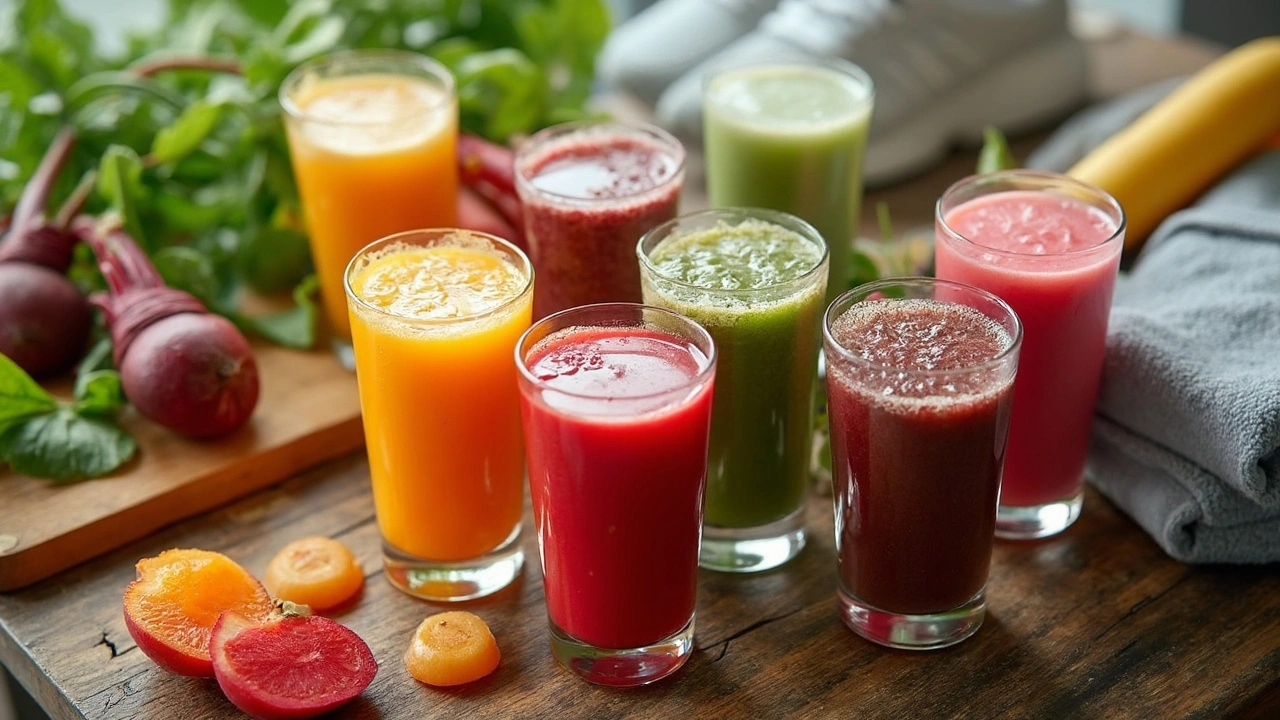You just crushed your workout and your muscles are humming. Now, here’s the twist that might surprise you: what you drink next can shape your recovery—and your gains. Forget the chalky shakes and heavy milks for a minute. More and more fitness pros and casual gym-goers are reaching for a bottle of health juice. Why? Let’s crack into the facts and tips that show why this vibrant, flavorful option isn’t some fad—it’s a science-backed, tasty powerhouse for your post-sweat routine.
The Science Behind Health Juice After Exercise
Right after you push through those last few reps or cross your final mile, your body doesn’t just rest. It starts repairing microscopic muscle tears and restocking depleted energy. What a lot of folks don’t realize: this is when your body is most eager for nutrition. Experts call this the "anabolic window," about 30-60 minutes after exercise, when your muscles are like super sponges, soaking up whatever fuel you drop in. Health juice fits perfectly into this window, and here’s why: it delivers vitamins, minerals, and fast-absorbing carbs almost instantly into your system. Studies conducted at Loughborough University found that fluids rich in antioxidants—like those found in many veggie and fruit juices—reduce post-exercise inflammation faster than water alone. And get this: researchers from the University of Exeter showed that beetroot juice (yep, that’s a health juice!) can boost muscle power recovery after exercise by up to 18% compared to water.
It’s about more than sugar and hydration. Many health juices are packed with electrolytes—think potassium from bananas, magnesium from leafy greens, sodium from celery. This stuff helps you avoid those killer post-workout cramps. In fact, a study in the Journal of Athletic Training measured athletes who drank watermelon juice post-exercise and saw muscle soreness drop by up to 40% compared to a plain water-drinking group. Beet juice has also been shown to improve oxygen use, meaning you’ll not only recover faster but also perform better at your next session.
Not all juices are created equal, though. "Health juice" means those made freshly from fruits and vegetables—think beet-carrot-apple, watermelon-cucumber-mint, or spinach-pineapple combos. Skip the supermarket options with added sugars or syrups. What your body needs most right now are natural nutrients and hydration, without the chemical junk. Want actual numbers? Here’s what a typical 12-ounce fresh health juice brings to your recovery game:
| Juice | Vitamin C (mg) | Potassium (mg) | Carbs (g) | Magnesium (mg) | Sodium (mg) |
|---|---|---|---|---|---|
| Orange-Carrot | 90 | 650 | 22 | 30 | 66 |
| Beet-Pineapple | 70 | 640 | 25 | 20 | 55 |
| Watermelon-Cucumber | 60 | 575 | 21 | 15 | 30 |
See those impressive stats? These nutrients kick-start recovery, fight muscle fatigue, and restore your body’s electrolyte balance—no powders or fake additives needed.
Why Hydration and Electrolytes Matter More Than You Think
When you sweat, every drop pulls electrolytes with it—sodium, potassium, calcium, and magnesium. And if you've ever felt dizzy or cramped up during the day after a tough workout, chances are it wasn’t just about being tired. According to the American College of Sports Medicine, losing even 2% of your body’s water can slow muscle repair, delay metabolism, and knock your focus off for hours. It’s not just about chugging plain water. Replacing lost electrolytes is the real key.
This is where health juice stands above most other so-called “sports” drinks. Commercial sports drinks usually hit the sodium mark but lack natural micronutrients. Fresh juice blends give you a bigger nutrition bang with vitamins and antioxidants tossed in, not to mention less processed sugar. A glass of watermelon-cucumber health juice, for example, rehydrates you and refills potassium and magnesium, helping you snap back from fatigue in record time.
Here’s another tip: citrus fruits in your juice (like lemon or orange) don’t just offer Vitamin C—they increase your body’s absorption of iron from plant sources. Why does this matter after a workout? Iron helps deliver oxygen to muscles, reducing exhaustion and helping you bounce back faster. Next time you’re mixing up juice, toss in some pineapple or a squeeze of lime.
Want to avoid that heavy, sloshy feeling after downing your drink? Juice is smooth, easy for your body to digest, and won’t weigh you down. The fluids get absorbed almost instantly, hitting your cells faster than the thicker stuff—great if you need to head from the gym to work and don’t want to feel sluggish.
You might ask: “Isn’t juice all sugar?” Only partly true. The natural sugars in fruits and veggies quickly top off your glycogen stores—the fuel muscles burn through during exercise. Still worried about sugar? Add more veggies or throw in a scoop of chia seeds. They add fiber and omega-3s for heart health and slow down the uptake of sugar into your blood.

The Nutrient Boost — Vitamins and Antioxidants on Tap
After a big sweat session, your body is fighting little battles—against inflammation, free radicals, and the tiny muscle breakdown that leads to soreness. Here’s where the real power of health juice kicks in. The antioxidants found in fresh juice—think flavonoids from berries, lycopene from tomatoes, or betalains from beets—combat cell damage and help your body bounce back stronger. One Harvard study found that people who drank antioxidant-rich juice regularly had up to 27% less post-exercise muscle soreness than those who stuck with plain water.
Let’s break down what you actually get in a typical glass of health juice:
- Vitamin C: Cuts down on muscle damage and supports your immune system, so you don’t pick up colds after tough workouts.
- Vitamin A: Essential for repairing skin and muscle tissue.
- Magnesium: Reduces cramping and keeps your heartbeat steady—especially if you sweat buckets.
- Potassium: Balances out salt in your system and regulates hydration, crucial for quick muscle recovery.
- Flavonoids and Lycopene: These plant compounds help fight oxidative stress and speed up tissue repair.
Some juices even boost brain health—think blueberries, which support memory and focus, or spinach for a shot of plant-based iron. If you’re feeling rundown, try adding a bit of ginger or turmeric. Both are legendary anti-inflammatories, and just a thumb-sized chunk of fresh ginger in your juice can bring down muscle soreness and support joint health.
Don’t forget about fiber. While most juicers remove a lot of it, you can add back in some pulp, chia seeds, or blend certain fruits whole (like berries or mango), so your drink also supports healthy digestion as you recover.
If you play sports or just push hard at the gym, swapping out your usual high-protein shake with antioxidant-loaded juice keeps your taste buds happy and your muscles supplied with the right tools to bounce back.
How to Make Your Own Perfect Post-Workout Health Juice
Making your own juice might sound like a hassle, but it doesn’t take much. And the results? Totally tailored to what your body needs after sweating it out. It puts you in the driver’s seat—you decide what goes in (and what stays out), whether you want extra greens for energy or pineapple for sweetness.
Here’s a fool-proof roadmap to making your post-workout health juice hit every recovery target:
- 1. Pick Your Base: Start with water-rich veggies and fruits to max out hydration—cucumber, watermelon, celery, or oranges work brilliantly.
- 2. Layer in Greens: Toss in spinach, kale, or romaine for magnesium, vitamin K, and iron. They’re less sweet, balancing the sugar from fruit.
- 3. Amp the Antioxidants: Add berries, beets, or carrots for recovery-friendly flavonoids.
- 4. Punch Up Protein (Optional): Blend a little Greek yogurt or a scoop of plant-based protein powder if you want muscular recovery and don’t want to miss the classic post-workout protein fix.
- 5. Top with Extras: Drop in a slice of ginger or turmeric, a handful of nuts, or a sprig of mint for flavor, inflammation-fighting power, and extra nutrients.
You don’t need anything fancy. A $30 home juicer or a solid blender works. Keep some good reusable bottles handy for on-the-go convenience—no need to splurge on something fancy from the store. For a quick, muscle-lovin’ juice, try this combo:
- 1 cup watermelon chunks
- 1/2 cucumber
- 1/2 lemon, peeled
- 1 medium beet, peeled
- A thumb of fresh ginger
Throw everything in your juicer or blender, strain (if you want), and you’re good to go. This mix is rich in potassium, Vitamin C, and natural anti-inflammatories—basically everything science says your body is craving after exercise.
Last tip—drink your health juice as soon as possible after your workout. Transport nutrients efficiently while your muscles are primed, and store any leftovers in the fridge for up to 24 hours to keep the nutrients as fresh as possible. If you want to make it a full meal, pair your juice with a boiled egg or a whole-wheat toast for slow-burn energy and extra satiety.
Once you get a taste for it, health juice is the kind of post-workout reward that actually feels indulgent—like you’re treating yourself, not just refueling. And the best part? Your body bounces back stronger, faster, and fresher for tomorrow’s workout.






